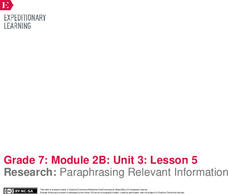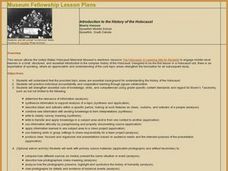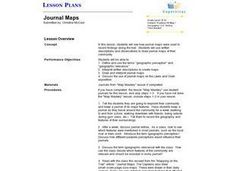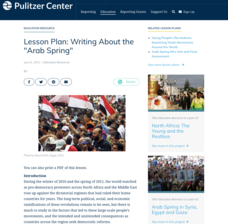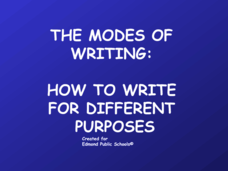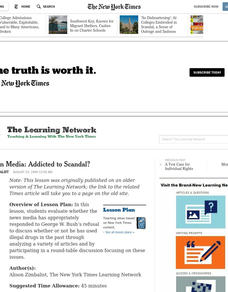Curated OER
Helping Homeschoolers: Rigorous and Relevant Writing
Maximize the strengths of the homeschooling relationship to improve the quality and focus of your child's writing.
EngageNY
Research: Paraphrasing Relevant Information
Readers take a look at the source Ethical Style: How Is My T-Shirt Made? and discuss how to say the information in the article without plagiarism. Learners make note of and underline sentences that may present a problem in paraphrasing....
EngageNY
Research: Paraphrasing Relevant Information
Young writers practice paraphrasing information from Truth in Advertising? They keep an eye out for examples of false advertising as they read, recording ideas and information in their researcher's notebook along the way.
EngageNY
Finding Relevant Information and Asking Research Questions: The Benefits of Video Games
Video games may not be so bad after all. As scholars read the text "The Many Benefits, for Kids, of Playing Video Games," they summarize the gist in their researchers' notebooks. Next, pupils draft supporting research questions based on...
EngageNY
Finding Relevant Information and Asking Research Questions: The Big Thirst
Let's get to the gist. As scholars continue their study of Charles Fishman's The Big Thirst, they practice writing the gist of the text. Additionally, pupils add notes about the industrial uses of water to their researcher's notebooks.
Curated OER
Getting Well
Scholars share ideas about health topics relevant to teens. They read posts on Well, the Times health blog, and produce their own health blog featuring teen health issues. In addition, they read and discuss the article "Well: A Times...
Curated OER
Hyperbole Lesson Plans: Ideas for the Art of Exaggeration
Hyperbole lesson plans and ideas that make figurative language instruction relevant to students' lives. Discover how to help learners better understand the figurative concept of hyperbole. A fantastic article which includes multiple web...
Curated OER
The Learning Network: Re-envisioning Classic Stories
Readers reflect on enjoyable stories they know, brainstorm criteria that make a story "good," analyze a New York Times article about innovative children's performances, re-envision classics on their own, and peer edit drafts. Use this as...
Curated OER
Rave Reviews
A fun instructional activity that utilizes toys and persuasion! After reading the article, which was written in 2005, pull some advertisements for toys currently being sold. These will be more relevant to your middle and high schoolers....
Curated OER
Lesson Plan: Blending Observation and Imagination
Upper graders analyze the work, Bouquet of Flowers in a Vase by Maria van Oosterwyck. They consider the value of her paintings and how they are still relevent and sought after, 350 years after they were created. The blending of...
The New York Times
Stress Less: Understanding How Your Mind and Body Respond to Anxiety
What could be more relevant to teens and preteens than experiencing stress? Use an article from the New York Times website to practice valuable Common Core skills for informational text reading, and also get a discussion going in your...
Curated OER
Introduction to the History of the Holocaust
The Holocaust is unbelievable! Examine this piece of history with your class. Using the Internet, research groups determine the relevance of information presented, compare how different sites present the same information, synthesize...
Edgate
Journal Maps
Inspire your class to look at their environments as if they were seeing them for the first time in order to gain a better understanding of the concept of perspective. After exploring their communities and keeping a journal of major...
Polk Bros Foundation
Contrast Points of View
Compare two positions on the same topic and assess the positions for logical argument with a basic worksheet. Pupils fill in information about each position, note down which position is more logical, and compose a few sentences...
New Bedford Whaling Museum
A New Bedford Voyage!
A thorough set of activities, articles, and reference material can enlighten your class about the history of whaling in New England. Kids travel back to a time when whale products were valuable and hunting whales was a way to help the...
Curated OER
APA Format and Citation
What is APA format, and how is it different from MLA format? Dive into the world of APA, investigate how to properly cite resources in-text, and look at a reference list of sources. Intended for higher education, not all of the...
Pulitzer Center
Writing About the "Arab Spring"
An information-rich resource, this webpage will provide your class with all the information they need to explore a relevant real-world and little understood topic: the Middle East and the people's revolutions that shook it in the spring...
Making Evidence-Based Claims: Grade 7
New ReviewThe most effective way to support an argument is with clear and relevant evidence. As seventh graders read and listen to Cesar Chavez's California Commonwealth Club Address, they work through five sections of a textual analysis unit,...
Nosapo
Body Language
When it comes to learning a language and literacy, understanding nonverbal communication is often as important as verbal communication. An interactive body language activity incorporates role play to demonstrate the difference between...
PBS
Racial Equality: How Far Have We Come and How Far Do We Have To Go?
Is everyone treated fairly in America? The culminating fifth lesson from a series of five has pupils explore racial inequalities from the 1960s and decide whether or not society has changed over time. The lesson comes with a speech from...
Edmond Public Schools
The Modes of Writing: How to Write for Different Purposes
Do your pupils know the difference between varying types of writing? This 57-slide presentation is made up of four sections: narrative writing, descriptive writing, expository writing, and persuasive writing. Split it up and use the...
Curated OER
International Communication: Why English?
In this international communication of why English worksheet, students participate in four activities including why important sites are relevant to the history of communication, matching explanations with sites and conversation starters...
Curated OER
Middle Ages Timeline
Students research a historical figure from the Middle Ages. In this Middle Ages lesson plan, students present important events of their characters life and of the time. Students write a time card for each significant event. Students...
Curated OER
American Media: Addicted to Scandal?
Students examine media coverage of George W. Bush's refusal to answer questions regarding past illegal drug usage in the 1999 campaign. They consider the role of rumor, scandal, audience and relevance in political media coverage.
Other popular searches
- Relevant Details
- Relevant Information
- Relevant and Irrelevant
- What Is Relevant Information
- Relevant Details in Reading
- Outline. Relevant
- Writing Relevant Details
- Asking Relevant Questions
- Outline Relevant
- Summary Relevant Details
- Relevant Questions
- Select Relevant Information




